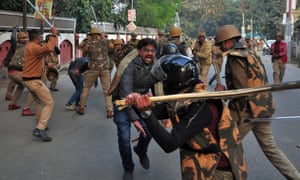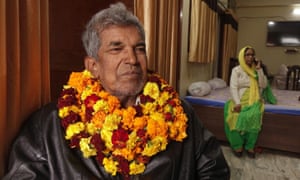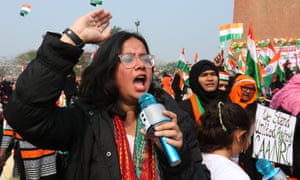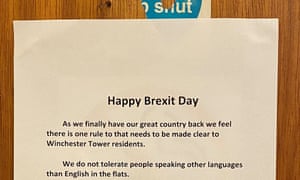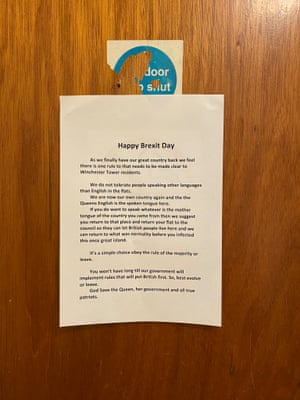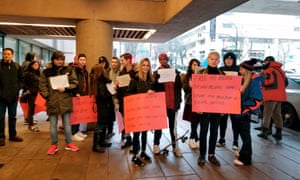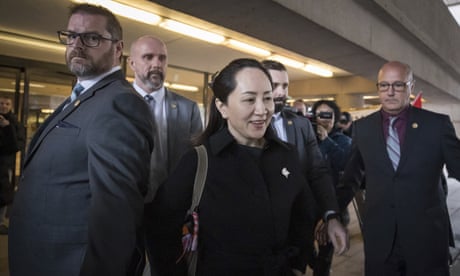Indian Americans, joined by civil rights groups, hold demonstrations in 30 US cities demanding repeal of CAA.
by Mohammad Ali 27 Jan 2020
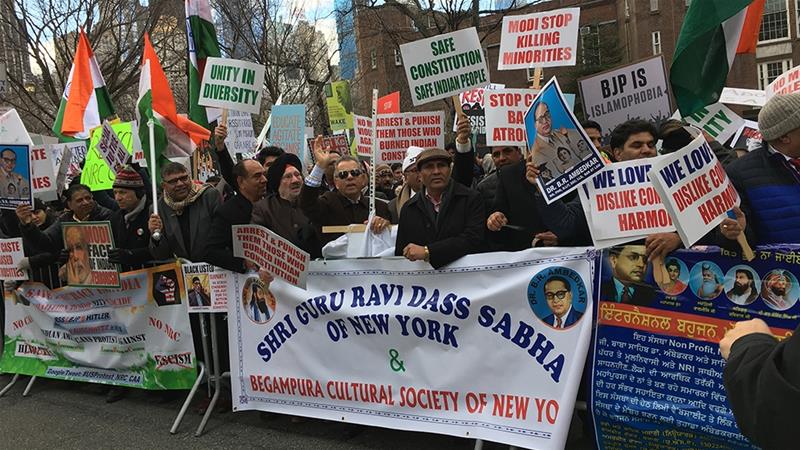
Hope
Students of Harvard University and representatives from the Indian diaspora also staged a 24-hour protest at Harvard Square in Boston to coincide with India's Republic Day.
"A lot of times I get tokenised because of my Dalit identity. It becomes almost a vulgarised presentation of Dalit body on a stage. But this protest I feel like I have agency and I am part of a larger dialogue," said Suraj Yengde, a researcher at Harvard University.
"But I would also hope that now that Dalits are coming for Muslims, there will be reciprocity in future," Yengde, author of a recent book, Caste Matters, told Al Jazeera by phone.
The protesters in Washington DC marched to the Indian Embassy.
"The brutal crackdown by government in India on the anti-CAA and anti-NRC protests has created a situation in which women in large numbers have come out on the streets to challenge the divisive-communal-fascist agenda of the government," said rights activist and Magsaysay Award winner Sandeep Pandey, who travelled to Washington, DC from India.
"It gives a hope that democracy and constitution can ultimately be saved by the common people from a government which is bent upon destroying them," he added.
A protest was also organised outside the Indian consulate in San Francisco.
"Indian Americans and people of conscience in the US are seeking accountability from the Hindu nationalist regime that wants to turn Indian Muslims into foreigners and render them stateless," said Ahsan Khan, President of the Indian American Muslim Council.
by Mohammad Ali 27 Jan 2020

Protesters have accused the Modi government of waging a war against Muslims, students, Dalits and marginalised sections of society [Mohammad Ali/Al Jazeera]
New York, United States - Thousands of Indian Americans, joined by several civil rights organisations, have staged protests across dozens of US cities against policies of Prime Minister Narendra Modi that critics say undermine the country's secular constitution.
On Sunday, which marked India's Republic Day, Mohammad Mustaqeem and his eight-year-old son, along with thousands of others, gathered outside the Indian embassy in New York to protest against the recently passed citizenship law that makes faith a basis for attaining Indian citizenship.
More:
Protests mark Republic Day celebrations
India's anti-CAA protesters launch postcards to PM Modi campaign
India's Supreme Court refuses to strike down citizenship law
The Citizenship Amendment Act (CAA) coupled with a plan to implement a nationwide counting of citizenship (National Register of Citizens or NRC) by India's Hindu nationalist government has triggered widespread protests in the South Asian nation.
In the northeast Indian state of Assam, nearly two million people were dropped from the citizenship list in 2019 and many fear a nationwide NRC will possibly render millions of Indians stateless.
Mustaqeem from the eastern Indian state of Bihar says his nephew Mohammad Irfan was among those injured last month when police stormed the library inside Jamia Millia Islamia university in New Delhi.
'Modi has started war against Muslims'
Mustaqeem says his nephew's left leg and right hand were fractured in the police action, which caused a public outcry. The students were protesting against the CAA and the NRC that activists say discriminates against India's Muslims.
"I can't go back to India right now. But I have come here to protest against the war Modi has started against India's Muslims," Mustaqeem told Al Jazeera.
He accused the Modi government of waging a war against Muslims, students, Dalits and marginalised sections of society.
"Instead of studying, my nephew is under treatment in Araria [Bihar state]. Is this the India we want to hand over to our next generation?" Mustaqeem asked.
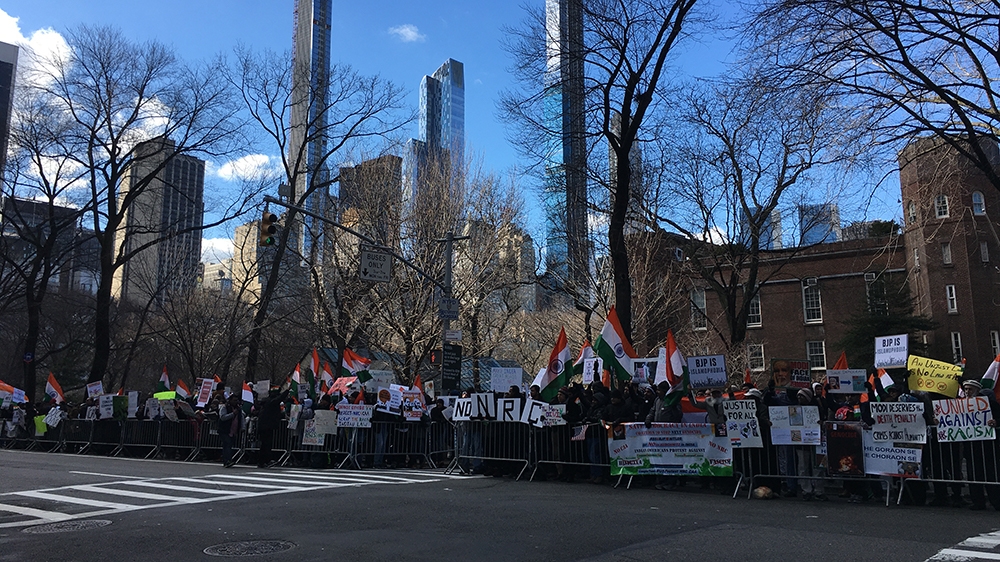
India American protesters hold banners at an anti-CAA demonstration in New York City [Mohammad Ali/Al Jazeera]
Waving hundreds of Indian flags, protesters raised banners against Prime Minister Modi, Home Minister Amit Shah, the ruling Bharatiya Janata Party (BJP) and its ideological parent, the Rashtriya Swayamsevak Sangh (RSS).
The New York protest was part of nationwide protests and marches organised by the recently formed Coalition to Stop Genocide - a broad coalition of Indian Americans and US-based civil rights organisations such as the Indian American Muslim Council, Hindus for Human Rights, Equity Labs, Shri Guru Ravidass Sabha of New York, Black Lives Matter and the Jewish Voice for Peace.
The protesters demanded the repeal of the CAA in India, and called for action by the US government, including possible sanctions on India's Home Minister Shah, as recommended by the US Commission on International Religious Freedom.
"What is happening in India, is happening in the name of Hinduism. But the Hinduism that we practise is inclusive and has love at its centre. Whereas the Hindu nationalism is exclusive by definition and seems to have hatred at its centre," said Sunita Viswanath from Hindus for Human Rights.
The protesting men, women and children of all ages held banners and shouted slogans against the Indian government's right-wing policies. They unfurled the Indian flag and recited the national anthem to mark their Republic Day.
A poster said "Hindu + Muslim = India’s greatest love stories. You can't change that," while another said, "When injustice becomes law, resistance becomes duty." Many posters referred to "Martin Luther King’s dream vs India's Nazi vision".
'We, the people of India'
With a banner flaunting Dalit icons like Saint Ravidas along with Baba Bhimrao Ambedkar – the architect of India's constitution - Sitaram joined the protest along with his friends from Connecticut.
"It is wrong to assume that the CAA is only against Muslim community. Laws like CAA and provisions like NRC and NPR represent the destruction of the constitution brick by brick by Narendra Modi," the 52-year-old said.
"If we don't speak now, there will be nothing and no one left to speak for," said Sitaram, who is associated with the International Bahujan Organization - a Dalit group.
He and other protesters read the preamble of the Indian Constitution reminding Modi that India belonged to "We, the people of India", as Modi has been accused of pushing a Hindu supremacist agenda.
Shaik Ubaid, one of the organisers, said that protests were happening not only in India but around the world and it represented a global consensus against the "draconian" policies of the Modi government.
"They are also a clear indication that the world will not stand idly by while Hindutva's supremacist worldview takes India down the path of fascism," said Ubaid who was part of an initiative which led to a ban on Modi's entry into the US after the 2002 Gujarat religious riots.
Reverend Chloe Breyer, Executive Director of the Interfaith Center of New York, said that Martin Luther King Junior, who was inspired by Mahatma Gandhi, "called to speak for the voiceless".
"The CAA makes an enemy of India's own precious people, damaging the pluralistic democracy that has existed since 1947 and has been such an inspiration to the world," Breyer told Al Jazeera.
New York, United States - Thousands of Indian Americans, joined by several civil rights organisations, have staged protests across dozens of US cities against policies of Prime Minister Narendra Modi that critics say undermine the country's secular constitution.
On Sunday, which marked India's Republic Day, Mohammad Mustaqeem and his eight-year-old son, along with thousands of others, gathered outside the Indian embassy in New York to protest against the recently passed citizenship law that makes faith a basis for attaining Indian citizenship.
More:
Protests mark Republic Day celebrations
India's anti-CAA protesters launch postcards to PM Modi campaign
India's Supreme Court refuses to strike down citizenship law
The Citizenship Amendment Act (CAA) coupled with a plan to implement a nationwide counting of citizenship (National Register of Citizens or NRC) by India's Hindu nationalist government has triggered widespread protests in the South Asian nation.
In the northeast Indian state of Assam, nearly two million people were dropped from the citizenship list in 2019 and many fear a nationwide NRC will possibly render millions of Indians stateless.
Mustaqeem from the eastern Indian state of Bihar says his nephew Mohammad Irfan was among those injured last month when police stormed the library inside Jamia Millia Islamia university in New Delhi.
'Modi has started war against Muslims'
Mustaqeem says his nephew's left leg and right hand were fractured in the police action, which caused a public outcry. The students were protesting against the CAA and the NRC that activists say discriminates against India's Muslims.
"I can't go back to India right now. But I have come here to protest against the war Modi has started against India's Muslims," Mustaqeem told Al Jazeera.
He accused the Modi government of waging a war against Muslims, students, Dalits and marginalised sections of society.
"Instead of studying, my nephew is under treatment in Araria [Bihar state]. Is this the India we want to hand over to our next generation?" Mustaqeem asked.

India American protesters hold banners at an anti-CAA demonstration in New York City [Mohammad Ali/Al Jazeera]
Waving hundreds of Indian flags, protesters raised banners against Prime Minister Modi, Home Minister Amit Shah, the ruling Bharatiya Janata Party (BJP) and its ideological parent, the Rashtriya Swayamsevak Sangh (RSS).
The New York protest was part of nationwide protests and marches organised by the recently formed Coalition to Stop Genocide - a broad coalition of Indian Americans and US-based civil rights organisations such as the Indian American Muslim Council, Hindus for Human Rights, Equity Labs, Shri Guru Ravidass Sabha of New York, Black Lives Matter and the Jewish Voice for Peace.
The protesters demanded the repeal of the CAA in India, and called for action by the US government, including possible sanctions on India's Home Minister Shah, as recommended by the US Commission on International Religious Freedom.
"What is happening in India, is happening in the name of Hinduism. But the Hinduism that we practise is inclusive and has love at its centre. Whereas the Hindu nationalism is exclusive by definition and seems to have hatred at its centre," said Sunita Viswanath from Hindus for Human Rights.
The protesting men, women and children of all ages held banners and shouted slogans against the Indian government's right-wing policies. They unfurled the Indian flag and recited the national anthem to mark their Republic Day.
A poster said "Hindu + Muslim = India’s greatest love stories. You can't change that," while another said, "When injustice becomes law, resistance becomes duty." Many posters referred to "Martin Luther King’s dream vs India's Nazi vision".
'We, the people of India'
With a banner flaunting Dalit icons like Saint Ravidas along with Baba Bhimrao Ambedkar – the architect of India's constitution - Sitaram joined the protest along with his friends from Connecticut.
"It is wrong to assume that the CAA is only against Muslim community. Laws like CAA and provisions like NRC and NPR represent the destruction of the constitution brick by brick by Narendra Modi," the 52-year-old said.
"If we don't speak now, there will be nothing and no one left to speak for," said Sitaram, who is associated with the International Bahujan Organization - a Dalit group.
He and other protesters read the preamble of the Indian Constitution reminding Modi that India belonged to "We, the people of India", as Modi has been accused of pushing a Hindu supremacist agenda.
Shaik Ubaid, one of the organisers, said that protests were happening not only in India but around the world and it represented a global consensus against the "draconian" policies of the Modi government.
"They are also a clear indication that the world will not stand idly by while Hindutva's supremacist worldview takes India down the path of fascism," said Ubaid who was part of an initiative which led to a ban on Modi's entry into the US after the 2002 Gujarat religious riots.
Reverend Chloe Breyer, Executive Director of the Interfaith Center of New York, said that Martin Luther King Junior, who was inspired by Mahatma Gandhi, "called to speak for the voiceless".
"The CAA makes an enemy of India's own precious people, damaging the pluralistic democracy that has existed since 1947 and has been such an inspiration to the world," Breyer told Al Jazeera.
Hope
Students of Harvard University and representatives from the Indian diaspora also staged a 24-hour protest at Harvard Square in Boston to coincide with India's Republic Day.
"A lot of times I get tokenised because of my Dalit identity. It becomes almost a vulgarised presentation of Dalit body on a stage. But this protest I feel like I have agency and I am part of a larger dialogue," said Suraj Yengde, a researcher at Harvard University.
"But I would also hope that now that Dalits are coming for Muslims, there will be reciprocity in future," Yengde, author of a recent book, Caste Matters, told Al Jazeera by phone.
The protesters in Washington DC marched to the Indian Embassy.
"The brutal crackdown by government in India on the anti-CAA and anti-NRC protests has created a situation in which women in large numbers have come out on the streets to challenge the divisive-communal-fascist agenda of the government," said rights activist and Magsaysay Award winner Sandeep Pandey, who travelled to Washington, DC from India.
"It gives a hope that democracy and constitution can ultimately be saved by the common people from a government which is bent upon destroying them," he added.
A protest was also organised outside the Indian consulate in San Francisco.
"Indian Americans and people of conscience in the US are seeking accountability from the Hindu nationalist regime that wants to turn Indian Muslims into foreigners and render them stateless," said Ahsan Khan, President of the Indian American Muslim Council.
